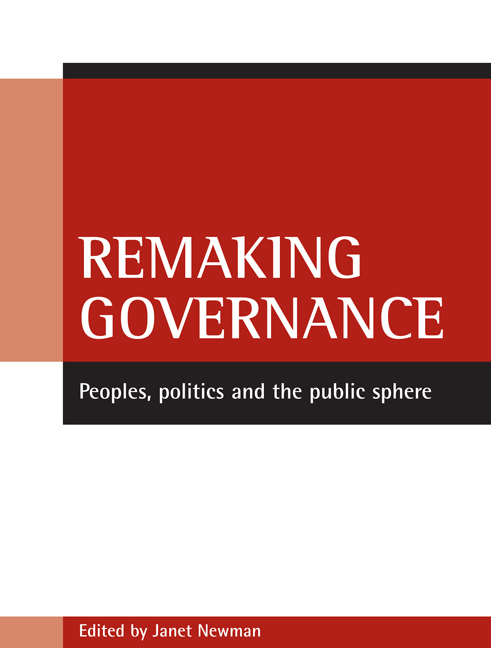Book contents
- Frontmatter
- Contents
- List of tables and figures
- Acknowledgements
- Notes on contributors
- Introduction
- one Reconstituting Europe: governing a European people?
- two Governance and the constitution of a European social
- three Remaking European governance: transition, accession and integration
- four Regendering governance
- five Welfare governance and the remaking of citizenship
- six Participative governance and the remaking of the public sphere
- seven Promoting democratic governance through partnerships?
- eight Among everyday makers and expert citizens
- nine Governance and the transformation of political representation
- Conclusion
- Index
three - Remaking European governance: transition, accession and integration
Published online by Cambridge University Press: 18 January 2022
- Frontmatter
- Contents
- List of tables and figures
- Acknowledgements
- Notes on contributors
- Introduction
- one Reconstituting Europe: governing a European people?
- two Governance and the constitution of a European social
- three Remaking European governance: transition, accession and integration
- four Regendering governance
- five Welfare governance and the remaking of citizenship
- six Participative governance and the remaking of the public sphere
- seven Promoting democratic governance through partnerships?
- eight Among everyday makers and expert citizens
- nine Governance and the transformation of political representation
- Conclusion
- Index
Summary
Introduction
Since 1989, Central Eastern Europe has faced continuous change. The transition from centrally planned to market economies was followed by European accession and subsequent integration into the wider process of European governance. These three processes (transition, accession and integration) are distinct, yet their interrelatedness forms a historically unique meeting point. This chapter explores the dynamics of integrating European and post-communist social policy, using a critical constructivist perspective to explore the dialogue between different social policy traditions that is taking place. As will be argued, the fragility of post-communist social policy manifests itself through dislocation, dissociation and the concept of control.
The chapter is divided into three parts. The first part provides a comparative insight into the development and architectural features of both post-communist and European Union (EU) supranational social policy. It argues that there are numerous similarities between the process of transition and EU integration. The second part provides a critical perspective of EU accession and the nature of this institutionalised dialogue. The final part elaborates on the integrative effects of the three transformative processes and highlights their fragility.
The dynamics of European and post-communist social policy: comparing European integration and post-communist transition
The institutional architecture of European integration – the creation and formulation of European supranational social policy – and the process of transformation in Central Eastern Europe have numerous similarities. Both can be interpreted as the emergence of distinct structures of governance, associated with political, legal and social institutions (Olsen, 2002). Both involve a transformation process that includes developing and strengthening organisational capacities for collective action; developing common ideas, new norms and collective understanding of citizenship (Checkel, 2001). Both are concerned with the creation of social policy and setting up a ‘social’ agenda in rapidly changing circumstances. In both, the processes of institutional change are substantially different from those characterising the formation of European welfare states. Both EU and post-communist ‘quasi-welfare states’ lack the cultural aspects of the welfare-state building process which took place at the nation-state level. Thus they need to be understood in terms of a distinct set of dynamics. In Table 3.1, four points of correspondence are traced between the dynamics of (post-communist) transition and (EU) integration.
- Type
- Chapter
- Information
- Remaking GovernancePeoples, Politics and the Public Sphere, pp. 59 - 80Publisher: Bristol University PressPrint publication year: 2005
- 1
- Cited by

